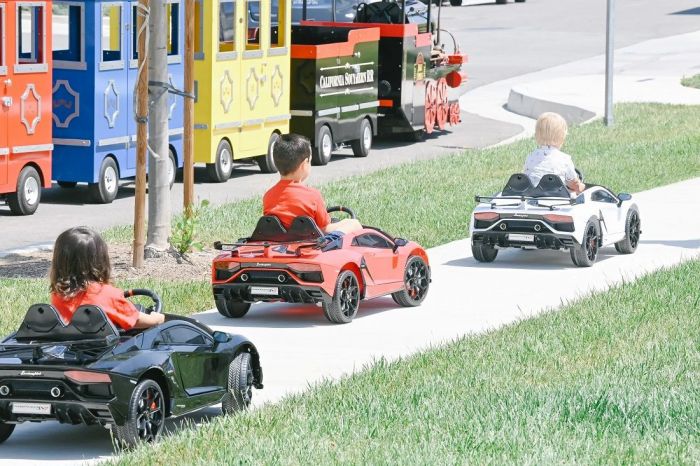
What Is the Role of Play in Early Childhood Education?
Play is not simply downtime - it’s a core part of learning. According to Dr. Stuart Brown, founder of the National Institute for Play, “Nothing lights up the brain like play.” Through play, children develop cognitive skills, emotional resilience, social competence, and physical coordination. In fact, The Role of Play in Early Childhood Education is so fundamental that organizations like UNICEF and the American Academy of Pediatrics classify it as essential to development, not optional.
At its core, play encourages curiosity. It gives children a safe space to explore ideas, try new skills, and express feelings. Whether it’s imaginative storytelling, role-playing with friends, or building with blocks, every playful activity offers layers of learning.
The Vital Role of Play in Early Childhood Education
From toddlers to school-aged children, the vital role of play in early childhood education cannot be overstated. Neuroscientist Dr. Jack Shonkoff from Harvard University’s Center on the Developing Child emphasizes that early experiences shape the architecture of the brain. The more engaging and joyful those experiences are, the more resilient and adaptive the brain becomes.
That’s why many progressive educators are now shifting toward play based learning in early childhood education. Instead of rigid drills or memorization, children learn through movement, creativity, and interaction - methods proven to strengthen memory, language, and problem-solving abilities.
Importance of Play in Early Childhood Education
Let’s break down the importance of play in early childhood education by domain:
- Cognitive Development: Play enhances executive function - the brain’s control center for planning, attention, and multitasking. For example, when a child builds a tower, they’re experimenting with physics, spatial awareness, and patience.
- Emotional Intelligence: Through pretend play and role play, children process emotions and learn empathy. A tea party may seem simple, but it teaches sharing, dialogue, and emotional reading.
- Social Skills: Cooperative games help kids negotiate, resolve conflicts, and communicate. These are the foundations of friendships - and healthy adult relationships later on.
- Physical Health: From running in obstacle courses to climbing soft play structures, active play supports gross motor skills and general fitness. It's also a joyful way to combat screen-time fatigue.
The World Health Organization recommends at least three hours of physical activity per day for preschool-aged children - play in early education meets that goal while building crucial developmental skills.
Value of Play in Early Childhood Education: More Than Just Fun
The value of play in early childhood education lies in its holistic benefits. It’s not just about the “fun” - though fun matters! It’s about building capable, confident children ready to tackle real-life challenges.
Studies by the LEGO Foundation show that learning through play promotes deeper understanding and retention compared to passive instruction. Children are more engaged and willing to take risks, and mistakes become learning opportunities rather than setbacks.
That’s the same philosophy we embrace at FunPlay World. Whether it’s our colorful jungle gyms, sensory zones, or role-play corners, our environments are crafted to stimulate creativity and exploration. Parents often tell us their children come home not just tired - but more talkative, more curious, and more confident.
Play Based Learning in Early Childhood Education: A Modern Movement
Play based learning in early childhood education is gaining popularity globally. In Finland, one of the highest-performing education systems, formal academics don’t begin until age seven. Instead, the focus is on exploration, arts, and social play. The result? High levels of academic success, mental well-being, and student engagement.
Here in the U.S., schools and parents are also realizing the importance of a less structured, more playful early education. Montessori and Reggio Emilia schools build curricula around play, movement, and real-world interaction. And the benefits are clear - children raised in play-based environments show stronger social and academic outcomes by age 10.
So, why is play important in early childhood education? Because it nurtures curiosity, resilience, and love for learning - qualities that no test score can fully capture.
Play in Early Years Education: Where It All Begins
The term play in early years education usually refers to activities from birth to age 5 - the foundational period of brain growth and emotional development. During this time, children are forming attachment bonds, discovering independence, and establishing their identities.
Play during these years should be:
- Unstructured (child-led and open-ended)
- Hands-on (tactile and sensory-rich)
- Social (interactive with peers or adults)
- Safe but challenging (opportunities for managed risk and physical movement)
Our birthday party packages at FunPlay World are designed around this philosophy. We believe birthdays should be more than cake and gifts - they should be learning experiences wrapped in fun. Each party includes supervised free play, interactive games, and sensory-friendly zones that delight both kids and parents.
Learning Through Play: What Parents Should Know
Many parents wonder: Is it enough for my child to just play? The answer is yes - if the play is rich, varied, and purposeful. That’s what learning through play means. It's about recognizing that a cardboard box can become a spaceship, or that running through a foam tunnel can teach spatial judgment.
You don’t need expensive toys or high-tech gadgets. In fact, simple activities - like dressing up, building with blocks, or storytelling - often provide the richest learning opportunities.
At FunPlay World, we carefully design our play zones to incorporate educational elements. From numbers and colors to social roles and cooperative play, every corner of our centers is an opportunity for discovery. That’s also why we encourage weekday visits in addition to birthdays - to make play a part of everyday learning.
Our Role as a Play Partner
At FunPlay World, we don’t just provide a space to play - we become part of your child’s early education journey. Our trained staff members understand child development and are skilled at facilitating inclusive, enriching play. Whether it’s a shy toddler finding their voice or a group of kids learning to cooperate on a team challenge, we’re here to support every step of the way.
Why Celebrate With Us?
If you're planning your child’s birthday, why not combine celebration with meaningful development? With our newly opened location, there’s never been a better time to explore what we offer. Our birthday packages include:
- Exclusive party room access
- Guided games led by trained facilitators
- Safe, soft play zones for all ages
- Personalized themes for imaginative play
- Zero-stress setup and cleanup for parents
We don’t just want your child to have fun - we want them to grow, bond, and create lasting memories. That’s the value of play in early childhood education, brought to life in the best possible way.
Final Thoughts
In a world increasingly focused on metrics and milestones, it’s easy to overlook the simple power of play. But if there’s one thing both science and experience have taught us, it’s that play in early education is not a luxury - it’s a necessity.
So next time you ask, “what is the role of play in early childhood education?”, remember this: it’s everything. It builds brains. It builds hearts. And it builds futures.
We invite you to visit FunPlay World and experience the magic of purposeful play. Come for a birthday party, stay for the laughter - and leave with a child who's grown in ways you can’t always see, but will always feel.











